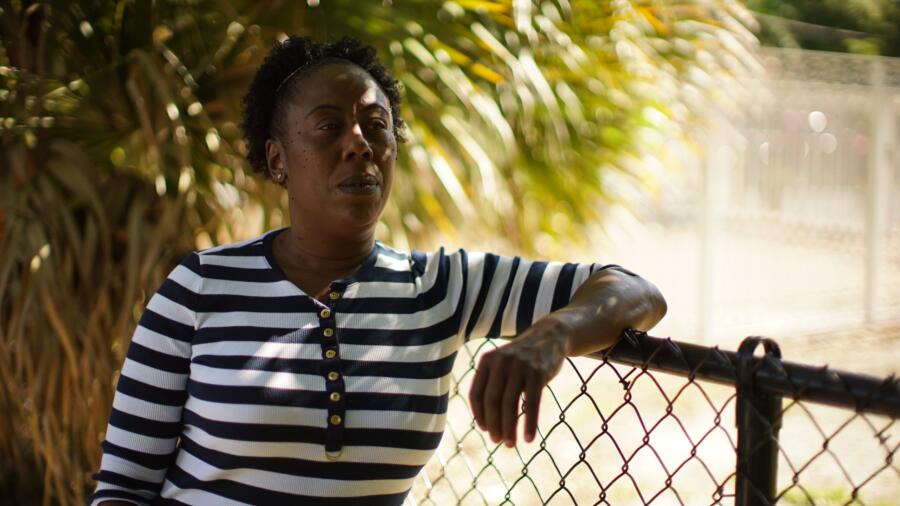On the surface, Michelle Ashley and Keith Jones shared a close friendship that spanned years. But when Jones—a decorated Marine veteran—was found brutally murdered in 1997, suspicion slowly turned toward the very woman he considered a trusted companion. It would take over two decades before Ashley stood trial, accused of orchestrating the robbery that ended her friend’s life. But was she a grieving friend—or the mastermind of a deadly betrayal?
A Night That Turned Fatal
On June 18, 1997, Jones had visited Lookers, an adult entertainment club in Fort Myers, Florida, where Ashley performed. The two left together and checked into the Tides Motel for the night. Hours later, Jones was found dead in that same motel room—beaten, robbed, and shot.
Police quickly suspected foul play. But despite identifying four potential perpetrators—Richard Fraser, Philip Boyd, Jamal Manson, and Gerard Jules—no one was arrested. The case soon went cold, and Ashley faded from public view.
A Surprise Arrest After 22 Years
In October 2019, authorities finally made an arrest. The suspect? Michelle Ashley—now going by Michelle Jackson. She was charged with first-degree murder with a firearm, accused of setting up Jones to be robbed and killed by her alleged accomplices.
Prosecutors argued that Ashley lured Jones into a vulnerable position and provided intel to his killers. Her motive? Allegedly money. The prosecution claimed she watched the robbers beat and shoot Jones, then feigned ignorance. Ashley, however, told a very different story.
Ashley’s Side of the Story
Ashley claimed she was also a victim that night. She said the men stormed the room unexpectedly, ransacked it, and forced her into their vehicle after the shooting. In her words, she was terrified and complied out of fear for her life. According to Ashley, she tried to help—she contacted police, provided names, and insisted she had no part in the planning.
“I thought I was going to die,” she later said during interviews. “I didn’t plan anything.”
Why Did the Case Take So Long to Go to Trial?
Despite her early statements to police, the case stalled. It wasn’t until 2016, when Fort Myers Police Chief Derrick Diggs renewed focus on cold cases, that the murder file was reopened. In 2018, a new detective took over. That’s when things shifted.
A crucial new piece of evidence came from Emely Bell, a woman who claimed Ashley had once hinted at plotting to rob Jones back in 1997. With that testimony, prosecutors secured a grand jury indictment, and Ashley was arrested.
The Trial: Truth or Betrayal?
Ashley’s 2022 trial captivated true crime fans across the country. The prosecution accused her of orchestrating a robbery that ended in cold-blooded murder.
“Keith Jones was executed,” said prosecutor Dan Feinberg. “And Michelle Ashley set it in motion.”
The defense, however, argued that the case was built on unreliable memories and speculation. They highlighted the lack of recorded statements, the missing evidence, and the unreliability of decades-old witness accounts.
In a bold closing, defense attorney Robert Harris asked the jury:
“Wouldn’t it be nice to have a tape of that interview so we could judge for ourselves?”
The Verdict: Acquitted After Decades of Suspicion
After four days of testimony, the jury returned a verdict: Not guilty. Ashley, now free, stood outside the courthouse and declared,
“I told you I was innocent.”
For the Family, No Justice—Only Pain
But for Keith Jones’ family, the verdict brought no closure. His twin brother, Kevin Jones, expressed frustration and sadness, saying:
“Twenty-five years later, my brother is still in the grave.”
They continue to believe Ashley played a role—and that others involved have yet to be held accountable.
A Cold Case That Still Haunts Fort Myers
The Keith Jones case is a chilling reminder of how easily justice can be delayed—and how hard it can be to revisit a crime after so many years. Whether Michelle Ashley was a scapegoat or a silent accomplice, the truth may never be fully known.
What’s certain, however, is this: someone got away with murder.
And for Keith Jones’ family, the wound remains as raw as the day it was inflicted.

